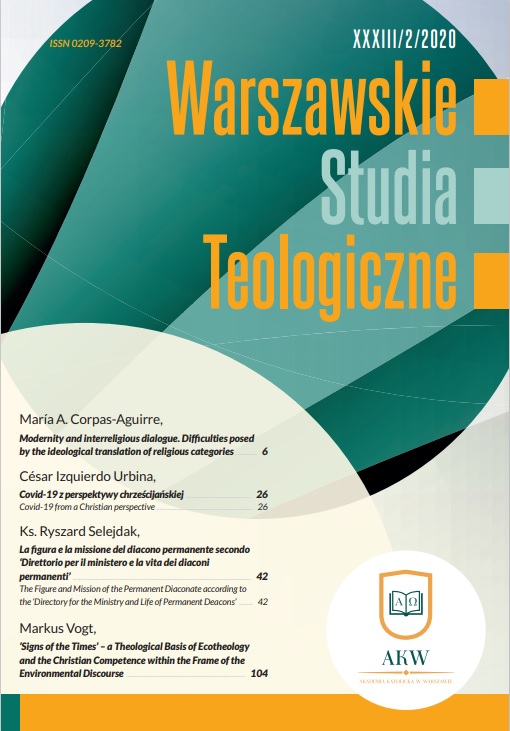La figura e la missione del diacono permanente secondo ‘Direttorio per il ministero e la vita dei diaconi permanenti
The Figure and Mission of the Permanent Diaconate According to the „Directory for the Ministry and Life of Permanent Deacons”
Author(s): Ryszard SelejdakSubject(s): Christian Theology and Religion
Published by: Akademia Katolicka w Warszawie
Keywords: Diaconate; Permanent Diaconate; Incardination; Obligations and Rights of Deacons; Service of the Word; the Liturgy and of Charity; Canonical Mission; Diaconal Spirituality; Ongoing Formation of Perman
Summary/Abstract: On 22 February 1998, the Congregation for the Clergy published the Directory for the Ministry and Life of Permanent Deacons. The document, which is divided into four parts, presents the juridical status of the Deacon, together with his ministry, spirituality and ongoing formation. According to the Directory, the diaconate has its source in the consecration and mission of Christ, wherein the Deacon is called to participate. Through the imposition of hands and the prayer of consecration, he is constituted a sacred minister and a member of the hierarchy. This condition determines his theological and juridical status in the Church. At the moment of Admission to Candidacy, all prospective Deacons are obliged to clearly express, in writing, their intention to serve the Church for the rest of their lives in a given territorial or personal circumscription, or in an Institute of Consecrated Life, or a Society of Apostolic Life, who have the faculty to incardinate. Acceptance of this written request is reserved for the competent Ordinary of the candidate. Incardination is a juridical bond that has ecclesiological and spiritual value in that it expresses the ministerial commitment of the Deacon to the Church. By virtue of the Order received, Deacons are united together in sacramental fraternity. The status of Deacons also comprises specific obligations and rights, envisioned in cann. 273-283 of the Code of Canon Law, where it speaks about the obligations and rights of clerics. The Directory recalls the tri-partite description of diaconal ministry given at the Second Vatican Council: service of the Liturgy, the Word and of Charity. Deacons can preside at the Liturgy of the Word, administer Baptisms, conserve and distribute the Eucharist, assist at and bless marriages in the name of the Church, bring Viaticum to the dying, read the Scared Scriptures to the faithful, instruct and exhort the People of God, preside at worship and prayer services, administer sacramentals, preside over funeral and burial rites, together with performing works of charity and support. The document by the Congregation for the Clergy underlines that diaconal spirituality has its foundation in the sacramental grace that is engraved in the Deacon’s soul, calling him to a complete gift of his person in the service of God in the Church. This spirituality is eminently Christological as it is intimately characterised by a spirit of service. With the diaconate, one seeks to imitate Christ who came to serve and not to be served. The Directory for the Ministry and Life of Permanent Deacons highlights the importance of ongoing formation for Deacons. Commitment is required here in continuity with the supernatural calling to a ministry of service in the Church, which together with initial formation, form part of a singular and organic Christian and diaconal journey. The document delineates four stages of formation: human, spiritual, intellectual and pastoral. The ecclesiastical norms recall that ongoing formation has the following characteristics: obligatory, universal, interdisciplinary, profound, scientific and propaedeutic of apostolic life. Deacons themselves are the primary agents of their ongoing formation, along their perennial journey of conversion. By their side stand the bishop and his Presbyterate, who have the task of helping them overcome any dualism or rupture between their secular lives and their diaconal spirituality, whilst also aiding them to respond generously to the demands and the responsibilities that the Lord has entrusted to them through the Sacrament of Holy Orders.
Journal: Warszawskie Studia Teologiczne
- Issue Year: 33/2020
- Issue No: 2
- Page Range: 46-69
- Page Count: 24
- Language: Italian

